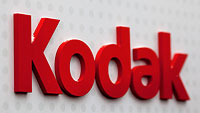Kodak patent portfolio sells for a $525M song to consortium including Apple, Google and Microsoft
posted Thursday, December 20, 2012 at 11:24 AM EDT

It's been almost a year now since Eastman Kodak Co. entered Chapter 11 bankruptcy. After many years struggling with its transition into the digital age, spiraling losses finally caught up with the one-time icon of the film photography industry, and despite planning to sell off a large chunk of its patent portfolio in an effort to keep itself afloat, a buyer couldn't be found in time. Now, as the one-year anniversary of Kodak's bankruptcy nears, the company has finally managed to sell those patents -- but at a price far below what it once believed possible.
When it first entered bankruptcy, Kodak suggested that the move would help it maximize the value returned from a sale of intellectual property it no longer felt was key to its core business. Over 1,100 patents the company felt it could do without were identified and grouped into two packages, each to be auctioned separately. With the benefit of Chapter 11 protection, Kodak believed it had the perfect chance to hold a closed auction, with interested parties feverishly competing to become the highest bidder, unaware as to how much their rivals were bidding or even as to their identities. Unfortunately for Kodak, that's not what transpired. The net result of bidding was lackluster, with the Wall Street Journal reporting initial bids in the region of just US$150 million to US$250 million, far below what Kodak was able to accept. Worse still, despite Kodak's intention that there would be strong competition, rumors soon began to swirl that several prospective bidders were aligning themselves to cooperate in purchasing the portfolio together, rather than fighting for the prize.
With the sale now completed, those rumors look to have hit the nail squarely on its head. The patents have been acquired by a consortium led by Intellectual Ventures Management LLC and RPX Corp, and although Kodak itself doesn't identify the twelve other entities that make up the consortium, court filings reportedly show that a number of very well-known names in the consumer electronics industry worked together. Doubtless, they saved themselves a not-insignificant sum in the process. And while the final sale price of US$525 million surpasses a vital threshold for Kodak, it falls far short of the US$2.2 billion to US$2.6 billion it once predicted the portfolios would fetch.
So... who are the twelve companies that will share the cost with -- and in return, receive licenses from -- Intellectual Ventures, which now owns the portfolio? According to the court filings, the new licensees include Adobe, Amazon, Apple, Facebook, Fujifilm, Google, HTC Corp, Huawei Technologies, Microsoft, Research in Motion, Samsung and Shutterfly. In the process, the deal neatly resolves ongoing legal action by Kodak against six of these companies -- Apple, Fujifilm, HTC, RIM, Samsung and Shutterfly.
While it may find itself not entirely satisfied with the way things have transpired, Kodak has reason to be thankful. The patent sale takes it one step closer to securing another round of financing for the company, which would help it work towards its goal of emerging from bankruptcy in the first half of next year. Announced late last month, the US$830 million in loans Kodak intends to receive depended in part upon the company's ability to sell the patent portfolios for more than US$500 million, which it has now done.
As for what's next for Kodak, the company continues to seek buyers for its document imaging and personalized imaging businesses, having already shed its image sensor and online photo sharing / photofinishing businesses, and having ceased operations in the digital camera, camcorder, photo frame and consumer inkjet printer markets. The plan is to come out of bankruptcy as a commercial printing and packaging business, and Kodak says it will still hold 9,600 other patents that it feels are key to its ongoing operations. One thing is certain: if and when Kodak exits Chapter 11, it's going to be a very different company to the one that entered the bankruptcy proceedings.
(Kodak sign image courtesy of Viktor Nagornyy / Flickr, used under a CC BY 2.0 license.)